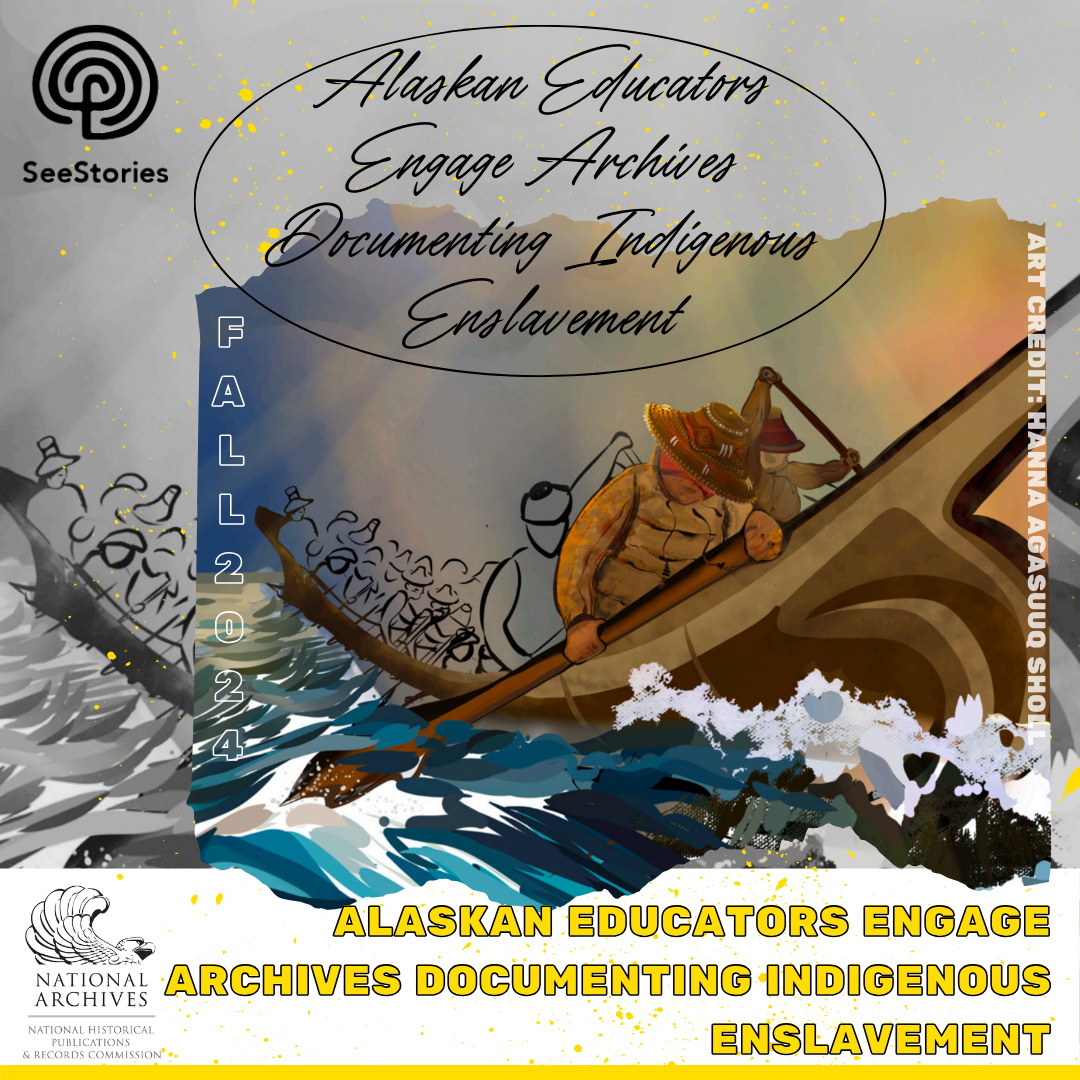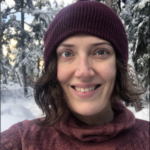Alaskan Educators Engage Archives Documenting Indigenous Enslavement

See Stories is offering a free 3-credit class for Alaskan teachers and professionals who work with 6th – 12th grade youth.
In this course you will explore place-based history of Indigenous enslavement through original research connecting stories of Indigenous enslavement to the unique place where they live and teach. The course will include guest presentations from Alaska Native scholars, culture bearers, historians, and educators. Participants in the course will design meaningful lesson plans that support your 6th – 12th grade students to engage with archival sources related to the history of Indigenous enslavement in Alaska.
The course will use a culturally responsive, trauma-informed lens. Participants will explore cultural bias in primary sources and strategies for how to Indigenize primary source research in the classroom by engaging elders and community members.
This course will meet the Alaska Studies course requirement of the State of Alaska for teacher certification. The course provides a framework for the understanding and teaching of Alaska studies through an examination of conflicting perspectives surrounding and emanating from key events in recent Alaska Native history. Considers the extended impact of these events upon Indigenous and immigrant residents, institutions of Alaska, and Alaska’s environment. Focuses on Alaska Native perspectives while exploring varying views of the social, economic, and political history of Alaska and the educational institutions and laws that affect the people of Alaska.
Cost: Free! Funding is provided by the National Historical Publications and Records Commission.

All sessions are required. Here’s the schedule:
Th Sept 5, 4pm – 6:30 pm
Sat Sept 14, 9am – 1 pm
Sat Sept 28, 9am – 1 pm
Th Oct 10, 4pm – 6:30 pm
Sat Oct 26, 9am – 1 pm
Th Nov 7, 4pm – 6:30 pm
Th Nov 21, 4pm – 6:30 pm
Sat Dec 7, 9am – 1 pm
Instructors

Hanna Agasuuq Sholl
Hanna Agasuuq Sholl is a Sugpiaq artist & educator who lives in Kodiak. She collaborates with See Stories on developing a Kodiak-specific Indigenous enslavement curriculum for teachers to implement in their classrooms. Sholl serves as See Stories’ Indigenous Curriculum Manager, leading a dedicated team of Indigenous creators developing curriculum on Indigenous enslavement across Alaska.

Megan McBride
Megan McBride (she/her) lives on Dena’ina lands in Anchorage. Before joining See Stories, McBride worked in education both as a high school social studies teacher and with the nonprofit program Alaska Youth for Environmental Action. She has a Masters in Teaching from Lewis & Clark College and is liscenced in social studies as well as Teaching English to Speakers of Other Languages. McBride believes in the power of bringing people together, sharing stories, and forging connections. As Education Programs Manager she leads See Stories’ professional development courses for educators.

Alberta Demantle
Alberta Demantle is an elementary educator in Akiak, Alaska. She is Alaskan Native, of Yupik and Athabascan descent. Demantle has participated in several See Stories teacher professional development courses, and led digital storytelling workshops with students in Akiak. She serves on the Steering Committee for this course and brings her lens of culturally responsive teaching.

Yaari Walker
Yaari Walker is a spiritual healer, scholar, and culture bearer. She serves as our Yupik Cultural Consultant from Savoonga on St. Lawrence Island. The topic of indigenous enslavement is personally important to her and her family’s history. Walker has worked as the Indigenous Consultant at Alaska Pacific University, a Culture Bearer at the Alaska Native Heritage Center, and as a Cultural Peer Support Specialist with Cook Inlet Tribal Council. She is a producer of the PBS One with the Whale and recently authored a memoir titled Aatak Ayguumun Angwaaghnaqi: Keep Paddling Against the Wind.

Amber Webb
Amber Webb is a Yup’ik and Sugpiaq artist, educator, and activist from from Curyung/ Dillingham, Alaska. She graduated from UAA with a BA in woven fibers and a minor in history in 2013. In 2018, she was awarded a Rasmuson Foundation Individual Project Award for a 12 ft qaspeq to honor MMIWG in North America. Webb is a member of the Steering Committee for this project because she is motivated to “expand the collective understanding of our history.” She shares, “It is our birthright to tell the truth today for all of the people who were prevented from confronting the oppression. When we share truth, we can be freed from the war of internalized and lateral oppression.”

Rachel Cohen
Rachel Cohen is an assistant Professor at the University of Alaska Fairbanks where she serves as the Head of Distinctive Print Collections & Archives. Cohen is a member of the Steering Committee for this project, guiding our engagement with archival resources. She loves helping people by connecting them with the information they need and facilitating access to the unique collections at the library. Originally from southeast Alaska, Cohen holds degrees in English and writing, library and information science, and theater history.

Holly Mititquq Nordlum
Holly Mititquq Nordlum is an artist, a graphic designer, traditional Inuit tattooer and filmmaker. She received a Bachelor of Fine Art Degree in Graphic Design and Photography from the University of Alaska Anchorage. Nordlum was named a Time Warner Fellow with the Sundance Film Festival, and received an Art Matters grant, and a Humanities Forum grant for her work documenting the Tupik Mi Project (traditional Inuit tattooing) – which was also featured in the New York Times Lifestyles Section Summer 2018, a Rasmuson Individual Artist Award, and was named to the Smithsonian’s National Museum of The American Indian’s Artist Leadership Program.

Golga Oscar
Golga Oscar is a self-taught artist who creates modern textiles that reflect his Yup’ik identity. He was born and raised in Kasigluk, Alaska, and graduated from the Institute of American Indian Arts where he earned a Bachelor of Fine Arts in Studio Arts with an emphasis in Photography. He works with different mediums ranging from leather/skin sewing, to grass weaving and walrus ivory and wood carving. Oscar is the only male seamstress in his extended family, carrying forward both his grandmother’s legacies. Oscar’s work is in permanent collections at the Anchorage Museum, Burke Museum, and International Folk Art Museum, and has been featured in Vogue Magazine. He has received recognition from First People’s Fund as well as the Rasmusson Foundation. As a fluent Yup’ik speaker, he is dedicated to keeping his culture and traditions alive and relevant by teaching the next generations about their language and art.

Dr. Haliehana Alaĝum Ayagaa Stepetin
Dr. Haliehana Alaĝum Ayagaa Stepetin (Unangax̂) is an artist, scholar, and activist. Her scholarly research engages Native North Pacific perspectives on food sovereignty and environmental justice in dialogue with Unangax̂ subsistence performances and sustainability protocols as interventions to the ongoing climate crisis. Stepetin’s passions include performing, choreographing, and composing Unangax̂ dance, especially with Tanam Anĝii Collective. Stepetin has a PhD in Native American Studies from U.C. Davis (Patwin Lands); a Master of Arts in Cultural Studies from the University of Washington Bothell (Coast Salish Lands), a Bachelor of Arts in International Studies with a concentration on Russia from UAA (Dena’ina Elnena).

Andrés Reséndez
Andrés Reséndez is a professor of history at University of California, Davis, whose interests include Mexican and Iberian history, the exploration and colonization of the Americas, and borderlands history. His book, The Other Slavery: The Uncovered Story of Indian Enslavement in America, details the imprisonment, trafficking, and abuse of hundreds of thousands of Indians in North America from the time of Columbus to the late 1800s and how it decimated the Native American population. A National Book Award finalist, the book won the 2017 Bancroft Prize honoring outstanding writing in American history.

Miranda Petruska
Miranda Petruska is Dichinanek’ Hwt’ana from Nikolai, Alaska. She received her Bachelor of Art Degree in Rural Development with a focus in Community Health & Wellness from the University of Alaska Fairbanks campus and is currently working on completing her Master’s in Social Work Degree from the University of Denver. Petruska has worked in Tribal healthcare for 17 years primarily in the Community Health Aide program. She currently serves as a board member for her village corporation and is working at a community behavioral health center in Port Angeles, WA, and previously was a board member of See Stories.
